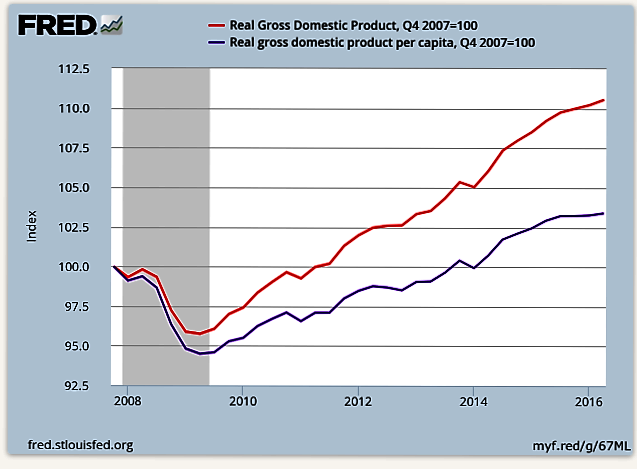Here I go again- telling you stuff I think you need to know but that’s kind of unpleasant to hear. I’d love to help you ignore it (come to think of it, I’d love to ignore it too), but it’s just not in my DNA.
As you know, every quarter the markets and the press and some of us wait eagerly (or maybe not so eagerly) for the Gross Domestic Product number to be announced. Then they get analyzed, discussed, manipulated, and dissected. Then we’re done until next quarter. GDP, by the way, gets revised months and even years after we hear the first number (dare I call it preliminary?) but we never hear about those revisions.
Anyway, since maybe the end of 2007 we’ve watched the announced GDP growth with more than usual interest. That growth hasn’t been as fast as we would all like, but at least it was at a nearly tolerable, if not historically attractive, rate.
One of the things we all recognize but don’t think about is that the population of the United States is growing. Not as fast as it used to, but it is growing. So our GDP, however much it is, has to be split among more people.
The chart below shows real GDP growth juxtaposed with per capital real GDP growth, which takes population growth into account. “Real” means they are adjusted for inflation.
What you’ll see is that since the 2007 peak, total real GDP is up 10.6%. Real per capita GDP is up a total of 3.4%. That’s over 9 years and it isn’t much.
What should you take away from this? Perhaps you should be cautious about your sources of information and dig a little deeper. As I’ve said before, the mainstream media isn’t, in my opinion, a reliable source of the kind of data that will make you think. Second, if you’re confused about why, in spite of some modest GDP growth, the economy seems so soft, you might consider the difference between overall real GDP and real GDP per capita. And you’ll notice in the chart how real per capita GDP growth has kind of flattened out.
Here’s a link to the article and web site where I found this data. This author and his site drives me nuts from time to time but damn, he makes me think.

You probably read enough that confirms your views. The foundation of the current media business is to tell audiences what they already believe — the tribal truths. That’s how to generate clicks!
The FM website seeks to show information and perspectives that challenge the established narratives. If we’re not “driving your nuts” with new data and perspectives, why bother?
Larry,
Thanks so much for responding. I had my “moment of clarity” some years ago when I first read Taleb’s The Black Swan. Somewhere in there he made what I seem to remember felt like an off hand comment that he never looked at the mass media because it offered him no useful insights. I stopped, and thought to myself “He’s right” and I’ve more or less ignored it all since then. And I completely agree with you- please keep driving me nuts from time to time. I’m counting on you.
J.
Jeff,
There is a reason why the media — all the sensible firms, that is — play to their audiences beliefs: it’s good business sense. Selling confirmation bias is profitable (massively so for the nodes on the internet, marginally so for everybody else).
There is no large market for challenging or contrary information. Challenge people on Twitter — no matter how politely — and they’ll ignore, mute, or block you (the rare exceptions are gold).
For a website — we’ve gained and lost several large audiences since opening in 2007. People come when we work a theme (left or right), then leave when the next theme challenges their beliefs. It’s a hobby, like collecting string.
I know it’s good business sense. I’m a consultant, but have this annoying tendency to say things people don’t necessary want to hear. It’s pissed some people off and, I believe, cost me some business. Oh well. In the active outdoors industry I’m in, we get together at trade shows and talk to people with similar perspectives and concerns that we’ve known way too long. Confirmation bias on steroids. I’ve pointed that out a few times, and people shake their heads and keep on doing it (my fear is that I keep on doing it too). Meanwhile, it seems to have become difficult to rare to be able to have a conversation with somebody you disagree with without one party or the other deciding the other side is an idiot and getting angry. I suppose that just makes our confirmation bias worse. I cherish those few instances where somebody explains to me why I’m wrong and we can talk about it.
J.